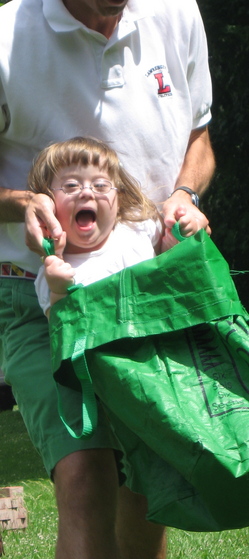(Emily is a woman who works with adults with disabilities. Due to privacy concerns, she has changed the names of her clients and asked that her last name be withheld.)
Working with people with disabilities was never something I
intended as a career. But five
years ago, I stumbled upon a job working with adults with developmental
disabilities in a group home. I was hooked. As I worked in the group home for three years, I did some
rather mundane tasks– cleaning bathrooms, doing laundry, grocery
shopping. I was also given the
opportunity to befriend four individuals very different from myself.
While I decided to apply for this job because I had some
vague idea of wanting to help other people, I had little understanding of how
much these people would help me in the years to come. I won’t lie and say that my patience was never tested as I
worked with them, but I can say that my eyes were opened to a new perspective
on life. I had grown up in a part
of the country where personal achievement mattered. Everything from the grades
I got in school to the name of college I attended to the prestige of companies
where I did my summer internships was highly scrutinized by others in my
community. At least, I felt like
it was. But in the group home,
none of that mattered. To those four individuals, the things that mattered were
whether or not I like to turn the music up while driving in the van, to have
pizza as a special treat, that I could tell a good joke, and that I was able to
understand.
It took a little while, but gradually I did begin to
understand. I began to realize how
misunderstood these individuals were. I saw that people would talk about them in their presence as if they
couldn’t hear or didn’t comprehend what was being said. I understood that they didn’t like it
when people did that. I understood
that even though most people viewed them as eternal children, as people who
would never grow up, that they were adults and had many of the same wants and
needs that I have. Like me, they
wanted close friendships, to fall in love, to spend time with family, and to
live life to the fullest. I
understood that they were people.
I suppose the most frustrating thing about working with my
clients was understanding what they wanted and knowing how difficult it was for
them to get it. Katie, who used a wheelchair, loved to spend time with her
mother. But because her mother was not strong enough to lift her anymore, she couldn’t
go home for a visit. Toby loved to go out dancing, but usually couldn’t because
he needed a staff person with him and staff was usually too busy. The list goes
on and on.
While I often feel that I am unable to do many of the things
that I would like, it is usually the result of one or more choices I have made.
For example, I can’t travel very much anymore because I decided to buy a new
car and need to work to afford the monthly payment. If I had just bought a used
car, however, I would have been able to afford to travel. The individuals I
worked with are restricted in what they do, but their restrictions are not the
consequences of the choices they have made. Although I think that my clients
have a good quality of life overall, throughout the years I spent working them,
I began to see these inabilities as a great injustice, something that needed to
be fixed.
I am still working on the solution. For now, I simply credit
my four clients in the group home for helping me to look beyond my own personal
achievement. They inspired me to try to find a way to improve quality of life
for people with disabilities. In the years I spent working with those four
individuals, I began to realize that it didn’t matter where I went to college
or how many A’s I got in school. The most important thing was to do something
with my life that meant something, that I was passionate about, and that made a
difference. In a way, they taught me how to live my own life to the fullest.
****For an explanation of the title “Perfectly Human,” and to read the first entry in this series, click here.

